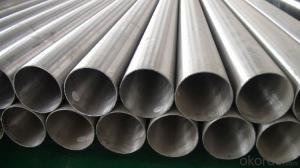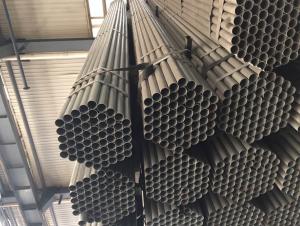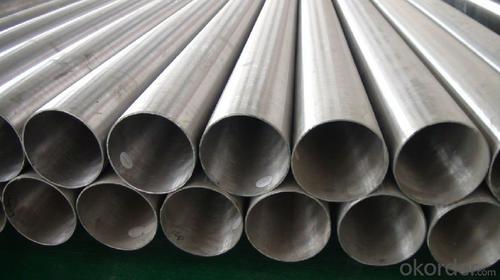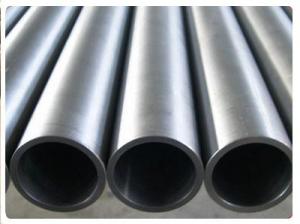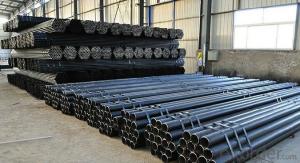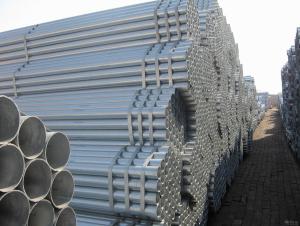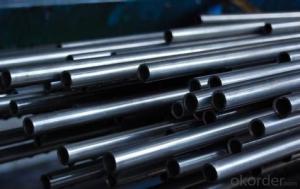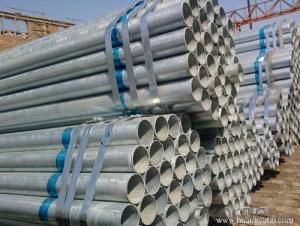1/2-4" GALVANIZED PIPE 200g SEAMLESS/WELDED
- Loading Port:
- Shanghai
- Payment Terms:
- TT or LC
- Min Order Qty:
- 25 m.t.
- Supply Capability:
- 12000 m.t./month
OKorder Service Pledge
OKorder Financial Service
You Might Also Like
1、Structure of 1/2-4" GALVANIZED PIPE 200g SEAMLESS/WELDED
The surface of galvanized steel pipe welded steel pipe of hot dip galvanized layer or. Galvanized can increase the corrosion resistance of the steel tube, prolong service life. Galvanized pipe is widely used, in addition to water, gas, oil and other general low pressure fluid pipelines. It is also used in the petroleum industry, especially for offshore oil field of oil well pipe and oil pipe, chemical, coking equipment of oil heater, condensation cooler, coal run oil exchanger tube, and trestle pile, the mine tunnel support frame tube.
2、Main Features of 1/2-4" GALVANIZED PIPE 200g SEAMLESS/WELDED
• High manufacturing accuracy
• High strength
• Good visual effect
• Reasonable price
• Small inertia resistance
• Strong heat dissipation ability
3、1/2-4" GALVANIZED PIPE 200g SEAMLESS/WELDED Specification:
Standard | GB, DIN, ASTM ASTM A106-2006, ASTM A53-2007 |
Grade | 10#-45#, 16Mn 10#, 20#, 45#, 16Mn |
Thickness | 1 - 33 mm |
Section Shape | Round |
Outer Diameter | 21 - 610mm |
Place of Origin | Tianjin, China (Mainland) |
Secondary Or Not | Non-secondary |
Application | Hydraulic Pipe |
Technique | Cold Drawn |
Certification | API |
Surface Treatment | factory state or painted black |
Special Pipe | API Pipe |
Alloy Or Not | Non-alloy |
Length | 5-12M |
Outer Diameter | 21.3-610mm |
Grade | 20#, 45#, Q345, API J55, API K55, API L80, API N80, API P110, A53B |
Standard | ASME, ASTM |
1) Material:20#(ASTM A 106/A53 GRB.API5LGRB,GB),45#,16Mn,10#.
2) Specification range:OD:21.3-610mm,WT:6-70mm,length:6-12m or according to the requirement of clients.
3) Excutive standards:GB,ASME API5L.ASTM A 106/A53,Despite of the above standards,we can also supply seamless steel pipe with standard of DIN,JIS,and so on,and also develop new products according to the requirements of our clients!
4) Surface:black lacquered,varnish coating or galvanized.
5) Ends:Beveled or square cut,plastic capped,painted.
6) Packing:bundles wrapped with strong steel strip,seaworthy packing.
4、Packaging & Delivery
Packaging Details: | seaworthy package,bundles wrapped with strong steel strip |
Delivery Detail: | 15-30days after received 30%TT |
5、FAQ of Galvanized pipe A53 100g/200g hot dipped / pre galvanized pipe:
①How is the quality of your products?
Our products are manufactured strictly according to national and internaional standard, and we take a test
on every pipe before delivered out. If you want see our quality certifications and all kinds of testing report, please just ask us for it.
Guaranteed: If products’ quality don’t accord to discription as we give or the promise before you place order, we promise 100% refund.
②How about price?
Yes, we are factory and be able to give you lowest price below market one, and we have a policy that “ for saving time and absolutely honest business attitude, we quote as lowest as possible for any customer, and discount can be given according to quantity”,if you like bargain and factory price is not low enough as you think, just don’t waste your time.Please trust the quotation we would give you, it is professional one.
③Why should you chose us?
Chose happens because of quality, then price, We can give you both.Additionally, we can also offer professional products inquiry, products knowledge train(for agents), smooth goods delivery, exellent customer solution proposals.Our service formula: good quality+good price+good service=customer’s trust
SGS test is available, customer inspection before shipping is welcome, third party inspection is no problem.
6、 Galvanized pipe A53 100g/200g hot dipped / pre galvanized pipe: Images:
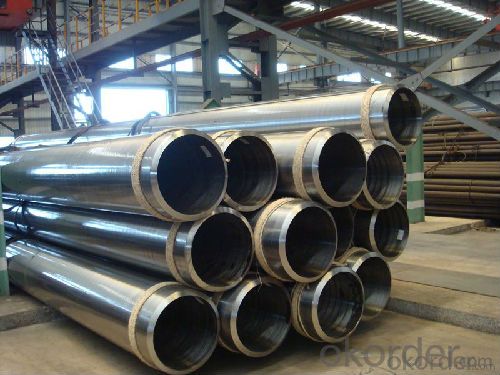
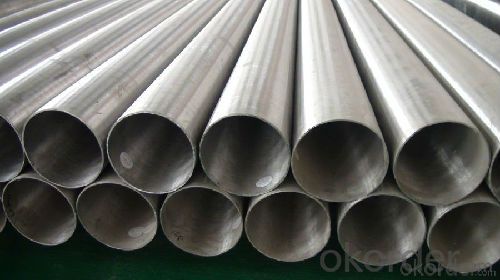
- Q: What are the common applications of steel pipes in the water distribution system?
- The common applications of steel pipes in the water distribution system include carrying potable water from the water treatment plants to homes and businesses, transporting water for irrigation purposes, and facilitating the flow of water in industrial processes. Steel pipes are often preferred due to their durability, resistance to corrosion, and ability to handle high water pressure.
- Q: What are the common methods of joining steel pipes?
- The common methods of joining steel pipes include welding, threading, and using mechanical couplings. Welding involves fusing the pipes together using heat, while threading involves screwing the pipes together using threads on the ends. Mechanical couplings are devices that connect the pipes together using compression or other means.
- Q: Can galvanized steel tubes simmer?
- Galvanized steel pipe can simmer bending.Is a set of bending bending bending die, no matter what kind of equipment, most are used in pipe, mainly used for oil and gas, infusion, more plays an important role in aircraft and engine.
- Q: How are steel pipes coated for protection against external elements?
- Steel pipes can be coated for protection against external elements through a process called corrosion protection coating. This typically involves applying a layer of protective coating, such as epoxy or polyethylene, onto the surface of the steel pipes. The coating acts as a barrier, preventing moisture, chemicals, and other external elements from coming into direct contact with the steel, thus reducing the risk of corrosion and extending the lifespan of the pipes.
- Q: What is the difference between cast iron and steel pipes?
- Cast iron pipes and steel pipes are commonly used in plumbing and construction, but they have distinct differences. Let's explore these disparities. 1. Composition: Cast iron pipes consist mainly of an iron alloy, with small amounts of carbon and other elements. Conversely, steel pipes are primarily composed of iron, but they also contain varying amounts of carbon and other alloying elements like manganese, chromium, and nickel. 2. Strength: Steel pipes generally surpass cast iron pipes in strength due to their higher carbon content and alloying elements. This makes steel pipes more suitable for high-pressure applications or areas with heavy loads. 3. Flexibility: Compared to cast iron pipes, steel pipes offer more flexibility, making installation and adjustment easier. Cast iron pipes, being brittle, are less flexible and more prone to cracking or breaking under excessive stress or impact. 4. Corrosion resistance: Steel pipes are usually more prone to corrosion than cast iron pipes. However, this can be mitigated with various protective coatings or treatments applied to the steel pipes. Cast iron pipes, on the other hand, possess inherent corrosion resistance due to the formation of a protective layer of rust on their surface. 5. Noise insulation: Cast iron pipes excel in noise insulation due to their dense and heavy composition. This makes them ideal for reducing noise in residential plumbing systems. Steel pipes, being lighter and less dense, do not offer the same level of noise insulation. 6. Longevity: When properly maintained, cast iron pipes have a lifespan of over 100 years. Steel pipes, while still durable, may have a shorter lifespan depending on factors like the quality of the steel used, environmental conditions, and maintenance practices. In conclusion, the primary differences between cast iron and steel pipes lie in their composition, strength, flexibility, corrosion resistance, noise insulation, and longevity. The choice between the two depends on specific requirements, such as desired strength, durability, and noise reduction properties.
- Q: What is the difference between steel pipe and HDPE pipe?
- Steel pipe and HDPE pipe have different compositions and characteristics, making them suitable for various applications. Steel pipe, made of steel, is a robust and durable material commonly used in industrial and infrastructure projects that require strength and reliability. It can withstand high pressure, temperature, and heavy loads, and is resistant to corrosion for both above-ground and underground installations. On the other hand, HDPE pipe is composed of high-density polyethylene, a plastic polymer. These pipes are lightweight, flexible, and easy to install, making them ideal for water supply, drainage systems, and agricultural irrigation. They are resistant to chemicals, abrasion, and UV rays, making them suitable for indoor and outdoor use. HDPE pipes also have a long service life and require low maintenance. In terms of cost, steel pipes are generally more expensive due to the raw materials and manufacturing process involved. However, they are chosen for their superior strength and durability in applications with high pressure or extreme conditions. HDPE pipes offer a cost-effective solution for applications that don't require the same level of strength and durability. In summary, the differences between steel pipe and HDPE pipe lie in their composition, strength, durability, and cost. Steel pipe is known for its strength and reliability, while HDPE pipe offers flexibility, easy installation, and resistance to chemicals and UV rays. The choice between the two depends on the specific application and project requirements.
- Q: Can steel pipes be used for conveying solid materials?
- Yes, steel pipes can be used for conveying solid materials. Steel pipes are commonly used in industries such as construction, oil and gas, and mining to transport solid materials such as ores, coal, grains, and various other solid substances. The durability and strength of steel make it suitable for handling the weight and pressure of solid materials during transportation.
- Q: What are the different types of joints used in steel pipes?
- The different types of joints used in steel pipes include butt weld, socket weld, threaded, and flanged joints.
- Q: What is the difference between steel pipe and aluminum pipe?
- The main difference between steel pipe and aluminum pipe lies in their composition and properties. Steel pipe is made primarily of iron and carbon, with other elements added to enhance its strength and durability. It is known for its high tensile strength, resistance to corrosion, and ability to withstand high temperatures and pressure. On the other hand, aluminum pipe is made from aluminum, which is a lightweight metal known for its excellent corrosion resistance, thermal conductivity, and malleability. While steel pipe is generally stronger and more rigid, aluminum pipe is lighter and more easily manipulated. Additionally, steel pipe is often used in applications where strength and durability are critical, such as in construction and plumbing, while aluminum pipe is commonly used in industries that require lightweight materials, such as aerospace and automotive.
- Q: Can steel pipes be used for steam systems?
- Yes, steel pipes can be used for steam systems. Steel pipes are commonly used in steam systems due to their durability, high temperature resistance, and ability to handle high pressure.
Send your message to us
1/2-4" GALVANIZED PIPE 200g SEAMLESS/WELDED
- Loading Port:
- Shanghai
- Payment Terms:
- TT or LC
- Min Order Qty:
- 25 m.t.
- Supply Capability:
- 12000 m.t./month
OKorder Service Pledge
OKorder Financial Service
Similar products
Hot products
Hot Searches
Related keywords
